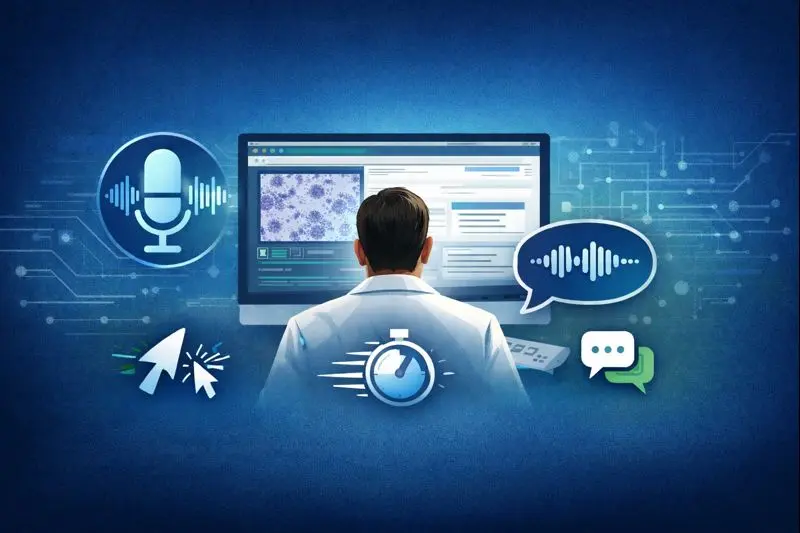Blog
Best Direct-to-Consumer Lab Testing Platforms: Feature Comparison and Analysis
November 17, 2025
Once a niche service, direct-to-consumer lab testing (DTC) has evolved into a major strategic focus for clinical laboratories.
Before the COVID-19 pandemic, some labs were experimenting with patient-initiated testing, and adoption greatly accelerated during the health crisis. The pandemic demonstrated the power of direct patient engagement, remote ordering, and digital result delivery to maintain continuity of care, even when in-person appointments were disrupted.
In today’s healthcare landscape, patients expect convenience, speed, and control. That’s why medical labs are increasingly partnering with DTC testing platforms that enable them to serve patients directly while integrating seamlessly with their existing laboratory information systems and lab revenue cycle management software. These platforms not only expand a lab’s reach but also diversify revenue streams and strengthen patient relationships.
This analysis compares LigoLab’s TestDirectly direct-to-consumer lab testing portal with several other leading DTC solutions, focusing on features, integration capabilities, deployment speed, and best-fit market segments. The goal is to help labs choose the platform that meets both their immediate needs and long-term growth strategies.
Industry Insights: Consumerism and How Clinical Labs Can Take Advantage of a Growing Trend
The Competitive Landscape
The direct-to-consumer lab testing market can be grouped into three main categories:
- Patient Engagement Portals – These integrate directly with LIS systems to provide a seamless clinical lab workflow from order entry to result delivery.
- Full-Service Providers – These offer comprehensive logistics, medical oversight, and sometimes branding, often serving as an intermediary between lab and patient.
- Niche Platforms – These specialize in a specific testing area, such as public health, sexual health, or functional medicine.
Our review covers six representative platforms:
- TestDirectly (LigoLab) – A web-based portal with a native LIS system and laboratory billing software integration that supports every DTC collection workflow, including at-home test kits.
- ixlayer – An enterprise-scale testing infrastructure provider.
- Everly Health – A consumer-facing brand with white-labeled options and test kit logistics.
- LetsGetChecked – A full-stack provider with proprietary at-home test kits.
- Healthvana – A mobile-first platform focused on public health and STI testing.
- Rupa Health – A practitioner marketplace for specialty and functional medicine testing.

DTC Platform Highlights and Comparison
TestDirectly (LigoLab)
TestDirectly provides a fully white-labeled platform, allowing direct-to-consumer labs to maintain complete control over their brand and patient experience. It supports optional at-home collection through partner networks, along with online patient registration, payment processing, and built-in appointment scheduling. Results are delivered via a HIPAA-secure portal, and native integration with LigoLab’s LIS system software ensures real-time data synchronization from order entry to final reporting.
Labs can handle medical oversight internally or use partner physicians, and the platform meets HIPAA, CLIA, and Emergency Use Authorization (EUA) compliance standards. Workflow customization is extensive, with preconfigured modules that can be adapted to various testing models. TestDirectly is known for its rapid deployment, often within two to four weeks, and for covering a broad range of testing scenarios, from drive-through events to retail at-home kits.
Discover More: Highlighting the Versatility of the TestDirectly Direct-to-Consumer Lab Testing Portal
ixlayer
ixlayer offers a white-labeled, enterprise-grade solution with full at-home collection support. Its platform includes online registration, payment processing, scheduling, and result delivery via secure portal or API. API-based integration provides flexibility across multiple LIS systems, and physician oversight is provided through a national provider network. Compliance includes HIPAA, CLIA, and EUA (for COVID testing).
Its high degree of customization makes it ideal for large-scale clients such as health plans, retail chains, and national lab networks. However, this enterprise focus typically comes with a longer deployment time, four to eight weeks, and higher costs.
Everly Health
Everly Health combines consumer brand recognition with a white-labeled DTC offering. Services include at-home kit fulfillment, online registration, payment, appointment scheduling, and result delivery through a secure portal and mobile app. PWNHealth handles medical oversight, with full adherence to HIPAA and CLIA regulations.
While the platform supports some customization, it mostly operates with standardized workflows. Lab information system integration often requires custom development, and because Everly serves as an intermediary, labs may have less control over branding and patient relationships. Deployment typically takes four to eight weeks.
LetsGetChecked
LetsGetChecked offers a turnkey, white-labeled direct-to-consumer lab testing solution featuring its own proprietary at-home test kits. The platform covers registration, payment, appointment scheduling, and result delivery via an app or portal. The company’s physician network provides medical oversight, and the system is compliant with HIPAA and CLIA requirements.
Integration with a lab’s LIS system requires custom work, and workflow customization is limited, favoring predefined test paths. The model works well for labs without existing DTC infrastructure but may dilute brand presence, as the LetsGetChecked name often remains visible. Deployment usually takes four to six weeks.
Healthvana
Healthvana takes a specialized, mobile-first approach, excelling in public health and STI testing workflows. It supports online registration, scheduling, and results delivery via text, email, PDF, or app. However, it does not provide at-home collection or payment processing. API-based integration is limited, and medical oversight is available only in select states.
Its strength lies in speed; it can be deployed rapidly for COVID or public health programs, but its narrower scope makes it less suited for general-purpose direct-to-consumer lab testing.
Rupa Health
Rupa Health targets the functional and integrative medicine market. It is not a fully white-labeled platform. Instead, it operates as a practitioner-facing ordering system. While it supports at-home collection and online registration, payments go directly to Rupa, not the lab. Appointment scheduling is not an option, and LIS system integration is unavailable.
This lack of customization and integration makes Rupa a niche option, appealing primarily to practitioners seeking curated specialty test menus.
Key Takeaways from the DTC Comparison
- Integration Strength – Native laboratory information system integration (such as TestDirectly’s with the LigoLab Informatics Platform) minimizes errors and speeds workflows compared to API-only connections.
- Launch Speed – TestDirectly and Healthvana can be operational in weeks, while enterprise-scale systems like ixlayer may take months.
- Brand Control – White-labeled solutions preserve direct lab-patient relationships, while intermediary models may limit visibility and margins.
- Market Fit – ixlayer and Everly Health are best suited for enterprise-scale clients; TestDirectly is ideal for mid-to-large-sized direct-to-consumer labs seeking both speed and flexibility.
Discover More: Expand Laboratory Services to the Home and Improve Patient Engagement with New Direct-to-Consumer Lab Testing Business Models

How Direct-to-Consumer Lab Testing Benefits Medical Labs
DTC testing is more than a convenience feature; it’s a revenue growth engine. By enabling patients to order tests directly, direct-to-consumer labs can offer unified, high-demand, self-pay services such as wellness panels, genetic testing, and infectious disease screening while also heightening their brand visibility.
This approach to patient outreach expands a lab’s reach, engaging health-conscious consumers, advocates of preventive care, and individuals in rural or underserved communities. Additionally, building direct relationships fosters brand loyalty and encourages repeat testing, and the insights gained from DTC programs can guide a lab’s new service development plans.
On-Demand Webinar: Learn How to Expand Your Lab’s Services and Add Revenue with Direct-to-Consumer Lab Testing
How Direct-to-Consumer Lab Testing Benefits Patients
For patients, direct-to-consumer testing means access, control, and empowerment. They can order tests online, schedule at-home collections, and receive results without waiting for a physician’s referral. This improves access to preventive care and chronic condition monitoring, while also supporting privacy, especially for sensitive tests (such as STI screenings or genetic analysis).
Transparent pricing removes financial uncertainty, and secure online portals ensure results are delivered as consumer lab reports quickly and confidentially. Ultimately, patients become active participants in their healthcare, thereby improving engagement and long-term outcomes.
Discover More: Telehealth Testing and Direct-to-Consumer Lab Testing Give Patients a Prominent Seat at the Healthcare Table
Choosing the Right DTC Platform: The Key to Sustainable Lab Growth
The direct-to-consumer lab testing platform market is diverse, with solutions ranging from specialized public health tools to full-scale enterprise infrastructures. Choosing the right platform comes down to balancing speed, customization, integration, and brand control.
In a market where patient expectations are evolving rapidly, investing in a robust, patient-centered DTC platform is a smart move for long-term growth and competitiveness.
Ready to Take Your Lab Directly to the Patient?
With TestDirectly, you can transform your lab’s outreach and operations in one move. This powerful, fully white-labeled platform integrates seamlessly with your lab’s existing LIS and RCM systems, creating a smooth, automated workflow from order entry to result delivery. No more manual data transfers, fragmented processes, or lost opportunities, just a streamlined digital system designed to boost efficiency, reduce errors, and accelerate turnaround times.






